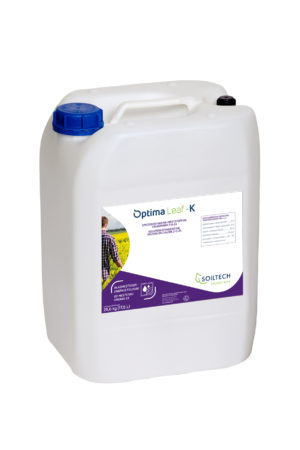Potassium is an indispensable nutrient for plant growth and is classified as a macronutrient because plants take up large quantities of it. A plant is only able to absorb potassium from the soil in a soluble form (K+). Potassium is highly mobile in the plant and plays a significant role in water management. Contrary to most other nutrients, potassium in the plant is not converted into complex organic molecules (except wood), but acts as a critical co-factor in facilitating numerous processes:
- Regulation of water pressure (turgor) in plant cells, important for stretching the cell walls, respiration (opening and closing of stomata), water intake and the orientation of leaves towards light.
- Activation of enzymes.
- Build up and transport of organic compounds in the plant such as sugars, amino acids and starch.
- Regulation of pH in plant cells.
- Capture of carbon dioxide during the photosynthesis process.
- Balancing of electrical load in various parts of the plant cell.
- When a crop is able to absorb sufficient potassium it has a greater ability to withstand stress and damage caused by insects and/or diseases.
- Potassium requirement of the crop during the growing season
For plants, potassium is the second more important constituent after nitrogen. A reduced potassium availability will cause growth to slow and the plant will extract potassium from old leaves. A severe potassium deficiency first manifests as chlorosis (yellowish discoloration) in the lower parts of the plant and especially in the tips and edges (tip burn). In addition, it impairs the lignification of vascular bundles, which causes plants to weaken and become susceptible to lodging.
The plant’s need to uptake potassium sharply increases during the season. There is a relatively high demand for potassium particularly during the period of flower formation and fruit set. As a positively charged ion, potassium is very important for the uptake and transport of negatively charged ions such as nitrate, phosphate and amino acids. Potassium plays a vital role in the translocation of sugars and starch from the leaves through to storage organs such as fruits, bulbs and tubers. If a potassium deficiency occurs during this period, it affects the quality of the produce to be harvested. In fruit vegetables, potatoes and onions in particular, potassium plays a crucial role in the ripening and storage phases.
Optimal potassium fertilising
Supplying minerals in the form of animal manure, compost and/or fertiliser will top up the levels of potassium in the soil at the beginning of the season. However, the availability of potassium greatly depends on the climatic conditions. Potassium can only be taken up the plant when it is sufficiently dissolved in the moisture in the soil. Too wet conditions will cause potassium to leach out relatively easily (especially on sandy soils) and relatively dry conditions reduce availability. This makes applying extra potassium during the season in the form of a foliar fertiliser a very interesting option. Foliar fertiliser offers many advantages, especially in crops such as potatoes, sugar beets and onions that have a high potassium demand. Especially for these applications, Soiltech has formulated the product ‘Optima Leaf-K’. This consists of organically complexed potassium. Unlike other potassium fertilisers, Optima Leaf-K has a relatively low EC (salinity), a neutral pH and has good miscibility with other substances. The product has proven its value multiple times in field trials in recent years, including with onion crops. We are pleased to show you the results of a field trial with onions. These figures were achieved in the extremely dry summer of 2018.
Treatment with Optima Leaf-K from Soiltech resulted in a +9% higher net yield in the trial. A very clear difference was noticeable, particularly in sizes >40 cm.


Trial
| Treatments | Specifications | Kg K2O |
| Control | Standard fertiliser (240 kg KAS per ha) | _ |
| Kali-60 | 200 kg/ha | 120 kg/ha |
| Patent-Kali | 400 kg/ha | 120 kg/ha |
| Powerleaf Kali | 3 x 3 liter/ha | 3,4 kg/ha |
| Bladkali TS | 3 x 5 liter/ha | 6,5 kg/ha |
| Optima Leaf-K | 3 x 5 liter/ha | 5,2 kg/ha |

